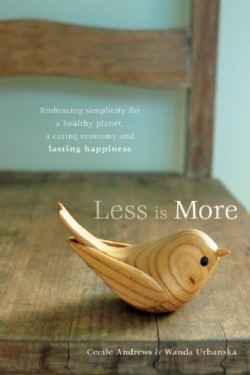Less is More
- 2009 INDIES Finalist
- Finalist, Social Sciences (Adult Nonfiction)
In the wake of the financial crisis, many Americans have downsized their lives, taking scissors to their credit cards and bid-ding their debt-financed bling goodbye. Given this cultural context, the timing couldn’t be better for the arrival of Less Is More, a new anthology about the burgeoning “voluntary simplicity” movement. Edited by Cecile Andrews (author of Circle of Simplicity) and Wanda Urbanska (host of PBS’s Simple Living with Wanda Urbanska), Less Is More makes for an accessible introduction to the virtues and pleasures of living simply in an era of global warming and market meltdowns.
As Andrews defines it, voluntary simplicity is all about “clearing away the extraneous [and] stripping away the inessential,” with the ultimate goal of creating a happier, healthier, and more sustainable society. The anthology’s contributors do not espouse a Luddite opposition to modern technology or pine for an idealized agrarian past. Instead, they argue that by working such long hours and spending so much money, many Americans have effectively traded slow and deep pleasures—such as lingering for hours over dinner with friends and family—for big bank accounts, hectic schedules, and oversized houses full of consumer goods that no one really has the time to enjoy. “More and more,” writes former Utne Reader editor Jay Walljasper, “it feels like our lives have turned into a grueling race toward a finish line we may never reach.” For Walljasper and the anthology’s other contributors, the solution lies in backing away from overworking and overspending, and instead seeking happiness in family, leisure, and meaningful labor in service of the community.
Despite their shared philosophy, each of the anthology’s nearly three dozen writers takes a distinct approach to the idea of simple living. Several Less Is More contributors (among them Bill McKibben and Affluenza‘s Dave Wann and John de Graaf) are stars in the worlds of environmental and cultural criticism, and their essays stand out for their insight and skillful expression. Still, the anthology’s true strength comes in the diversity of its voices—which include not only journalists and activists, but also businesspeople and ministers.
Packing so many contributors into a brief anthology does come at a cost—most essays are too short to achieve much depth, and thus may seem slight to readers already familiar with voluntary simplicity. But for those new to the concept, Less Is More will serve as an informative and inspiring primer.
Reviewed by
Ryan Michael Williams
Disclosure: This article is not an endorsement, but a review. The publisher of this book provided free copies of the book to have their book reviewed by a professional reviewer. No fee was paid by the publisher for this review. Foreword Reviews only recommends books that we love. Foreword Magazine, Inc. is disclosing this in accordance with the Federal Trade Commission’s 16 CFR, Part 255.

